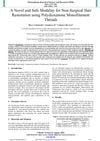scalp tattoos to mimic the appearance of light stubble
signaling protein that, when suppressed, may grow hair by reducing inflammation and stem cell loss
Microscopic delivery system that sends growth-promoting signals to hair follicles
supplement to help with hair texture and quality



